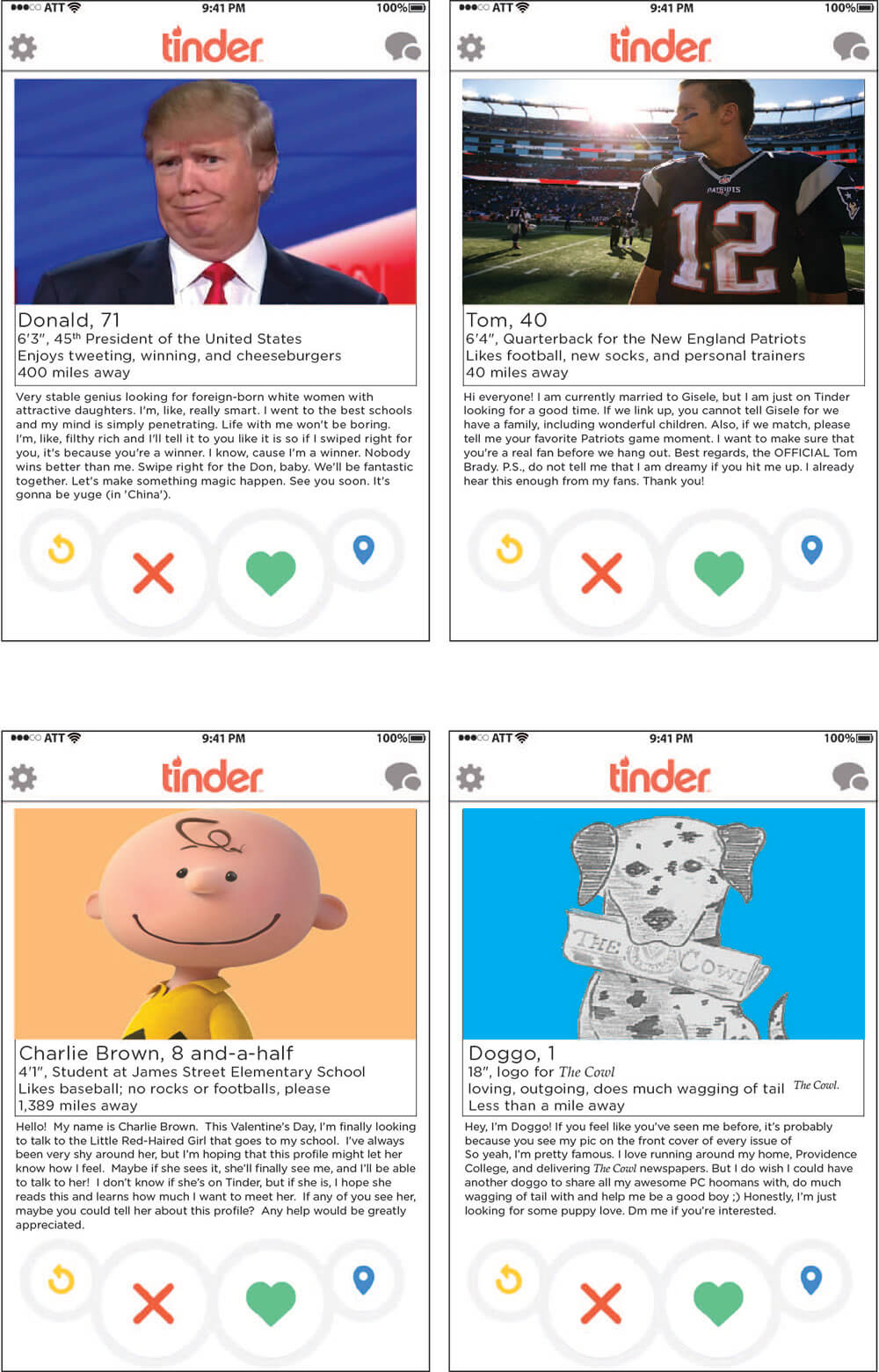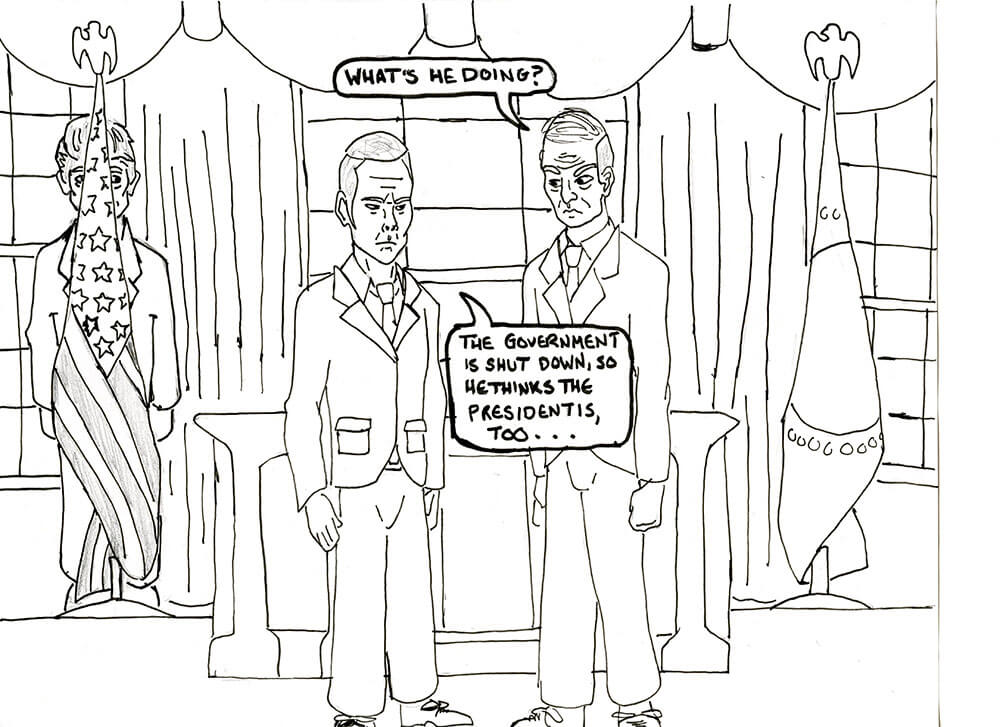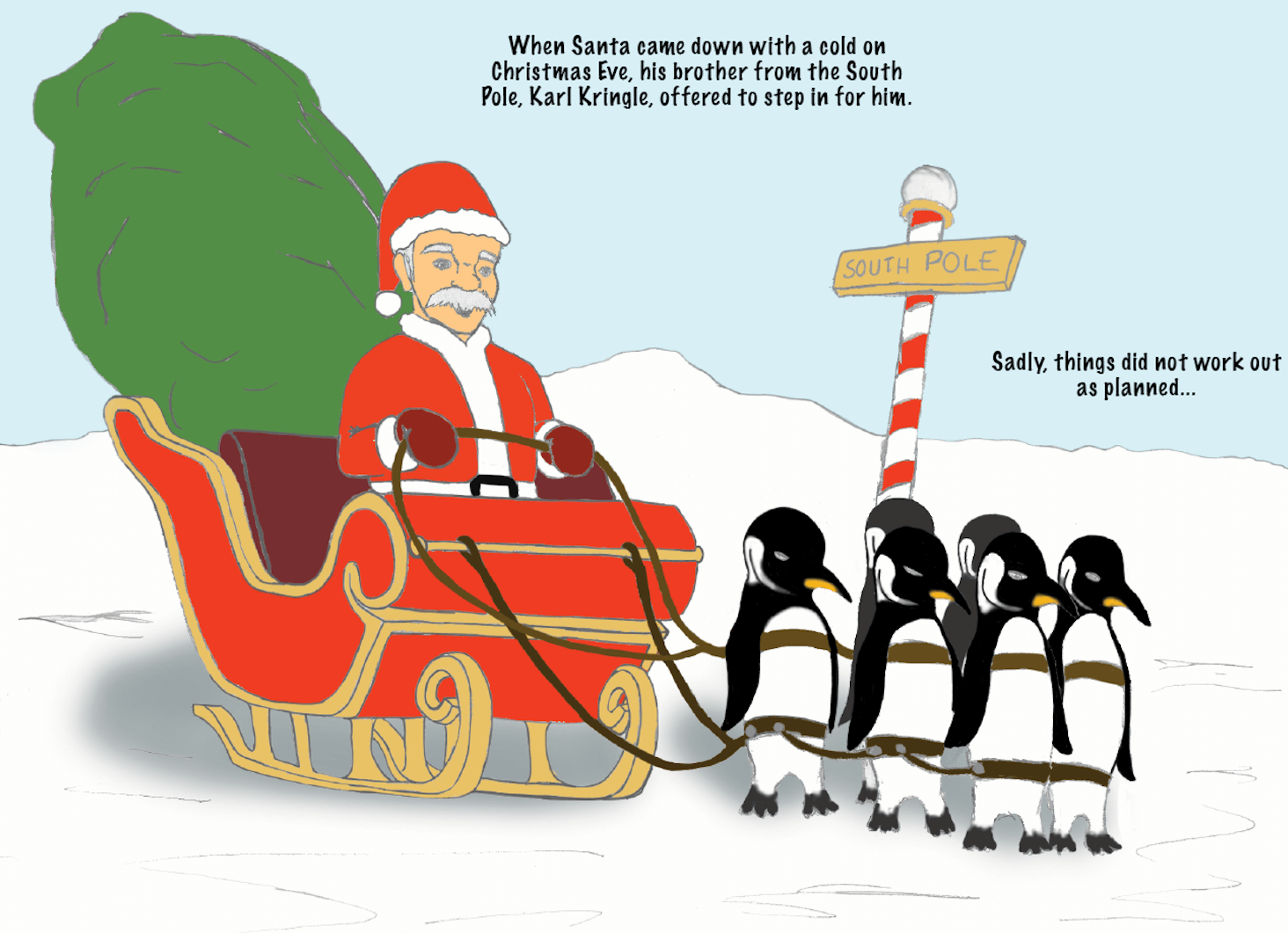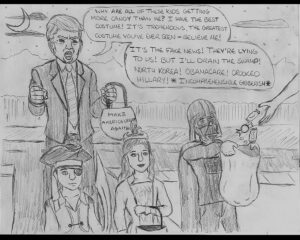Tag: David Martineau ’18
The Greatest Lesson
by The Cowl Editor on May 3, 2018
Portfolio
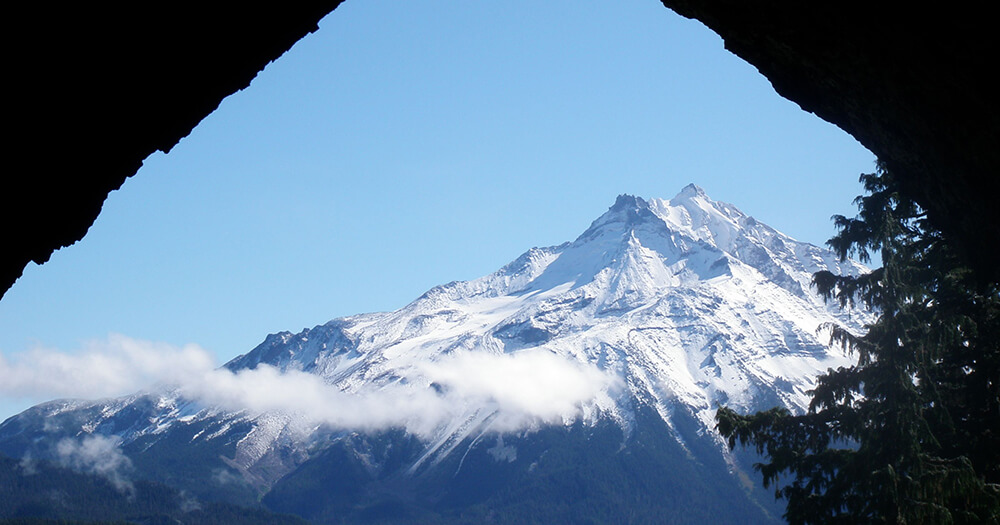
by David Martineau ’18
High atop the windswept peak of a nameless mountain, a young man dressed in heavy furs pulled himself up onto a jagged ledge and rose unsteadily to his feet. Clearing snow and frost from his eyes, he blinked against the driving wind towards the entrance of the cave that yawned before him. A wave of disbelief and vindication surged through him at what he had done, keeping his frostbitten limbs warm enough to press on. He had traveled many miles, crossing hills and valleys and rivers, all to find this place. This legendary cavern was said to be the dwelling place of a great hermit, a master monk who, supposedly, knew the secrets that all men wished to know.
Beyond the entrance to the cave, the howling storm outside seemed to fade into nonexistence, all sound of it driven away by the oppressive quiet of the cavern’s walls of stone. Cupping his hands before his mouth to warm them with his breath, the young man surveyed the interior of the cave with a quick glance. It was completely dark, except for a small point of flickering light that emanated from a single candle, the only object in the cavern that was man-made. Seated behind the candle, his face obscured by a hooded robe, was a man of indeterminate age. Despite the solemnity of his surroundings, the young man felt himself smile. He approached the monk with solemn steps, kneeling before the candle and waiting to be addressed.
To his surprise, the monk said nothing. His shadowed face was silent as the minutes dragged on. When the cold was beginning to threaten the young man with madness, he finally broke the decorum of the moment and said, “Great Master…I have been searching for you.”
The monk lifted his hooded eyes with a surprisingly ungraceful jerk, and then he said, “Oh…hello there. You seem to have caught me while I was asleep.”
The young man felt his confusion and astonishment increase. This was hardly how he had expected his journey of enlightenment to begin, with a grueling hike and a sleeping monk. Nevertheless, he pressed on. “They say you are the master who knows the greatest secrets of the universe,” he said.
“They? Who’s they?” the monk asked. “Is it that farmer from the village—what was his name? You shouldn’t listen to him. He once tried to sell me a bucket of apples for three times their average price.”
The young man shook his head. “What? I’m not talking about any farmer. I’m talking about the greatest mystics and scholars in the world. They all say that you are the wisest monk who ever lived, that you have discovered the mystery of life. I came here because I want you to teach me!”
The monk tilted his head slightly. “And why would you want to do that?”
“What do you mean, why?” the young man sputtered, now getting frustrated. “Don’t you think that I’d like to know the meaning of life?”
The monk shrugged. “I don’t know. Is it really that important to you?”
The young man couldn’t believe what he was hearing. “Yes! It’s very important to me!”
“Why?”
For the first time since he had begun the conversation, the young man found himself forced to pause. He had never really considered why he had gone on the journey of self-discovery that had led him here, to what was supposed to be the wisest man on Earth. His life was not much different than anyone else he had known back home. All of his friends were just like him—newly-graduated, thrust into the large world outside their narrow perspectives with just enough preparation to inform them of how hopelessly unprepared they were, and utterly uncertain of what was to happen in the future.
The thought of that happening to him had been enough to make him flee from it to join missionary groups, charitable organizations, and anything else that could forestall the inevitable burden of reality that threatened to crush him, even now. Turning back to the monk, he said, “I don’t know. I guess…I guess I just want to know that there’s a reason for it all.”
The monk chortled quietly. “And you had to come all the way up here to realize that?”
“What do you mean?”
The monk leaned forward, and the young man—for just an instant—caught the barest outlines of a face that was like every other face he had ever known. “Son,” the monk said, “there’s a reason for everything that exists, for everything that you do. The reason is what you make of it all. Life isn’t about finding the truth. It’s about looking for it.”
The young man couldn’t help but feel disappointed.
“So…that’s it?” he asked. “All of that questioning, wondering what’s right and wrong? I did it all just to find out that the meaning of life is not to know the meaning of life?”
The monk smiled. “I know…annoying, isn’t it?”
The young man grimaced angrily. “It’s more than annoying!” he burst out. “It’s infuriating!”
“It will be,” the monk said. “For a while. But then you’ll see that it’s actually freeing. The meaning is always out of reach, so you have to make your own while you’re here. It’s not about finding the ‘right way’ to do something, the absolute key to living your life. It’s about trying, and failing, and using that failure to succeed the next time. Do you think that you can do that?”
The young man looked at the ground for a moment. “I…I think so.”
“Good!” said the monk. “Then I guess we’re done here.”
The young man rose, feeling both exhausted and enlivened. Turning towards the entrance of the cave, he began to leave, only to turn back and ask one more question. To his shock, he found that the monk was gone, candle and all, as if he had never existed. The young man looked around, uncertain, and then took a deep breath before starting the climb down.
Perhaps, he thought, some questions are better left unanswered.
Snow
by The Cowl Editor on April 19, 2018
Portfolio
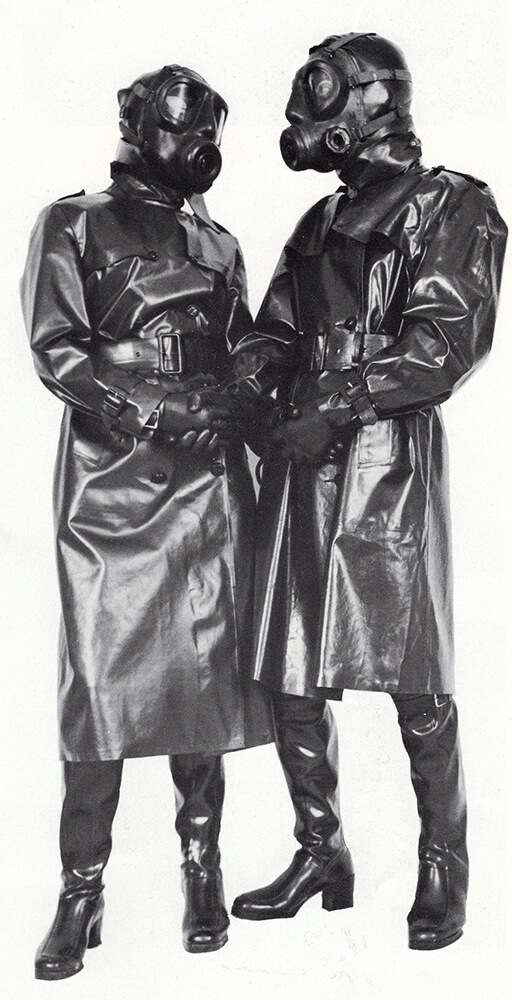
by David Martineau ’18
“It’s really cold out today!” I said, my hands trembling as I stuffed them in the pockets of my thin coat. Beside me, Johnny walked with his head lowered in a sullen silence. He had been unusually quiet since we left school, but I didn’t bother to ask why, because I already knew.
“We’re not going to get caught, you know,” I said after a few moments. When he didn’t answer, I added, “Besides, what were we supposed to do? The next tram wasn’t for an hour. Do you want Mom and Dad to worry?”
Johnny shot me a glower, the same look he’d give me whenever I jokingly reached for a classroom window during school hours, even though we both knew that they couldn’t open. For identical twins, we certainly weren’t much alike—Johnny had always been more serious than me, and much more concerned with The Regulations. I knew from the moment we snuck out of the tram depot that he was poring over The Rulebook in his head, trying to determine exactly what punishment we’d be facing if we were caught.
I sympathized with his concerns, if only slightly, and sure, I could understand the Sovereignty’s decree, at least from an objective standpoint. Our tutors had always been careful to instruct us in what they called “Correct Compliance,” which is basically just another way of saying, “Follow The Rulebook,” which had been set up soon after the Sovereignty rose to power in the wake of the Great Extinction. Because the human race had become so small, it was necessary to ensure that all healthy offspring reached maturity without complications, so that they could restore human society to its former strength.
Our tutors knew better than most of us what the consequences of being noncompliant were, so they did their damned best to make sure that they weren’t liable for any “errors” we made. I never really paid attention to their lectures on following The Rulebook. All I bothered listening to were their two main points: “Never instigate or respond to physical violence,” and “Never go outside.”
I liked to joke around with Johnny, and so whenever I got the chance, I pretended to be on the brink of breaking The Regulations. Moving to jump out of a window, escape through an air vent, or mime a punch in his or another’s direction always got me the same glare of disapproval.
This time, though, there was no joking around. I almost couldn’t believe it when he had agreed to sneak out of the depot with me, even though I argued quite logically that the distance between the depot and our house was short enough that we could walk it in far less time than it would take to wait for the next tram. I wasn’t going to wait an hour to get home just because our last health seminar got out late when I could take a short walk outside and make it there in half the time.
As we kept walking, I could see that Johnny was getting nervous. He had probably moved on to Phase Two of his usual ruminations, in which he pondered not only the immediate consequences of noncompliance, but its long-term effects on our eligibility and status. That was another common lecture in our health seminars, where it was stressed that even the most innocuous of errors could result in lasting damage to our bodies, which would lessen our appeal as “progenitors of the revived human race.” A major noncompliance—like the one we were committing right now—could affect our rank in the selection process, in which young men and women are paired together for the purposes of procreation. Johnny, being the stickler that he was, couldn’t tolerate the thought of being considered unappealing as a mate.
I had to snap him out of the mood he was in—after all, if he grew sullen enough, he might just rat us both out to our parents when we got home. Looking around, my eyes fell on the ground, which was covered by a layer of snow that had fallen overnight. Grinning, I bent over as I walked, scooped up a handful of the frigid snow, and tossed it casually at Johnny. “Heads up, sour-puss!” I called out.
The snow struck Johnny on the shoulder, leaving streaks of white on his coat that resembled an explosion of paint. He froze in his tracks, as much from the shock of being struck as from the coldness of the snow. Then his face grew red like fire, standing out against the bland gray of his jacket and the white smear that now marred it. “Michael!” he shouted, using my full name, as he did whenever he was angry with me. “What are you doing?” He frantically tried to wipe the snow off of his shoulder. “Do you want us to get caught?” he raged.
The thought that the snow on his jacket would be a clear indicator of our noncompliance came a moment too late. I felt a brief stab of panic, but I managed to rein in my fear. “It’s okay, it’s okay,” I stammered, trying to calm myself as much as I was trying to calm him. “We can get it all off.” I hurried over to help him, and soon enough, we had erased every last trace of the snow on his jacket, except for a dark smudge where the fabric had soaked up some of the moisture. It’ll be fine, I thought. It’ll dry off by the time we get home.
Not a moment after we removed the snow from his jacket, Johnny’s hands lunged forward and shoved me away. “You idiot!” he shouted. “You can’t just leave well enough alone, can you?”
I raised my eyebrows in surprise—after all, Johnny had just violated the second of the two major tenets of The Rulebook. Then again, we were already guilty of one violation, and no one was around to see the other. “I’m sorry,” I said, lifting my hands in a calming gesture. “I wasn’t thinking.”
“No, you weren’t! You never think! You couldn’t have just waited for the next tram, couldn’t you? You had to do it your way!”
Now I began to get angry, the heat flushing to my cheeks a clear sign. “You didn’t have to come with me, lamebrain,” I snapped. “You could’ve stayed in the depot.”
“Yeah, and leave you to get caught all by yourself…or to make fun of me whenever I got home.” Johnny’s face lost a bit of its anger, which was replaced by shame and regret. “All I want is for our family to be safe. I don’t know if what the Sovereignty says is right…but I do know that if we get caught, it won’t matter either way.”
I didn’t have anything to say to that. I knew he was right, just like we all did. The thought of being punished for a mistake as silly as the one I had made us both commit now terrified me. Was an hour really too long to wait?
I reached out and placed a reassuring hand on my brother’s shoulder. “Don’t worry,” I said. “We’ll be fine. We just need to get home quick…”
A low humming sound cut off Johnny’s intended response, and we both turned, somehow knowing the terrible truth before we saw it.
A sleek black vehicle, hovering about a foot off the ground, was approaching along the abandoned street. It stopped a few feet in front of us. Its doors hissed open automatically, allowing two figures to exit. I couldn’t figure out if they were male or female, for both of them were clad in heavy black gear made from some baggy material. Their faces were covered by masks with breathing tubes coming out of them, attached to tanks on their backs. They looked like something I had seen in my nightmares, but I knew that I wasn’t about to wake up in my bed, safe and sound.
Without a word, they grabbed me and Johnny and threw us into the vehicle, where we sat behind a glass partition which separated us from their section of the transport. When the doors hissed shut after them, my brother and I were plunged into darkness, unsure of where we were going or what would happen next.
Dust
by The Cowl Editor on March 15, 2018
Portfolio
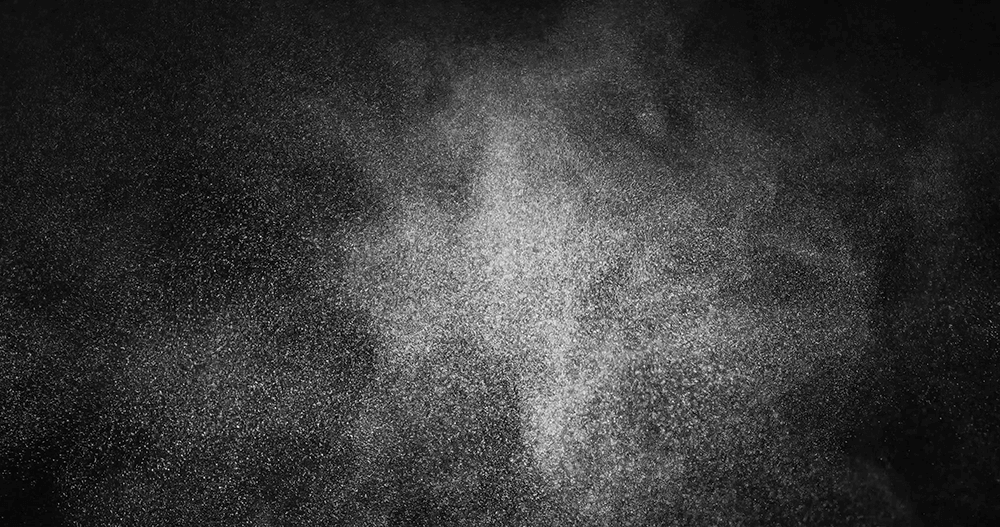
by David Martineau ’18
Flipping the switch reveals a universe in motes of dust. They hang in the heavy air, immobile but active. Scintillating like a thousand stars that have appeared to fill the foyer, they seem to wish that only I could see them. And simply flicking a switch can reveal such wonders. These galaxies upon galaxies of fluttering specks are a miracle to me, and so too is the light which shines on them, like the moon does a midnight sky. I can illuminate them with the simplest movement, and thus am like the god of their tiny universe, who has the power to utter, “Let there be light” with a mere wave of my hand. Without me, these specks of dust are nothing. They will never be noticed or pondered, and their simplicity will pale before my complex majesty. But then, I also am like a speck of dust, trapped in a universe of my own. I am lost in an endless array of stars, ones of a different kind than these motes of dust, and I wonder if—somewhere out there—there is another light, another switch, and another hand, one which might illuminate me, or already has.
The World
by The Cowl Editor on February 15, 2018
Poetry
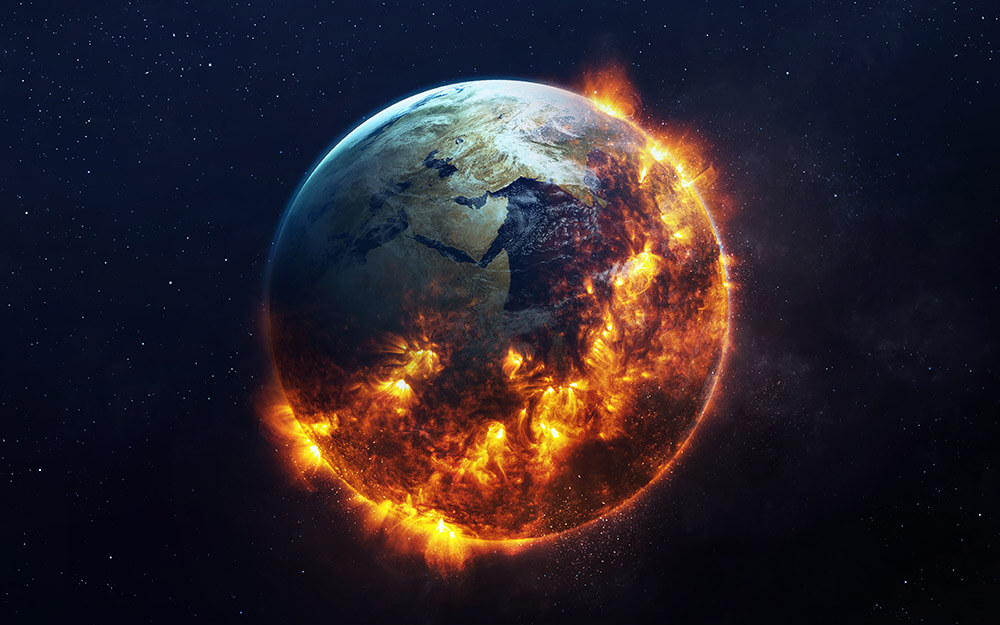
by David Martineau ’18
You grow on me like a coat of fur, but offer me no warmth.
And sometimes all I would like to do is shave you off,
But I cannot, for you are my children.
Before, when I was whipped by fire and scarred by ice,
When my skin blistered and burned and burst open with molten sores,
The pangs of birth that brought me out from the bowels of the void,
I thought of you, and could endure that pain.
For you were going to save me, improve me
Take what little I had and make it new,
Like the acorns that spawn new forests
After fire has devastated them.
But instead of building, you burn,
Instead of feeding my beauty, you consume it.
Instead of loving me, you take me for granted.
Instead of giving me Life, you bring me closer to Death.
I wish, sometimes, that I could be rid of you,
That I could return to the torments of my youth, and forget you.
But I cannot, for you are my children.

